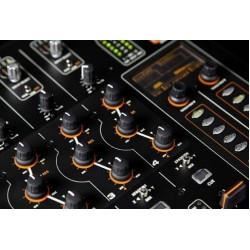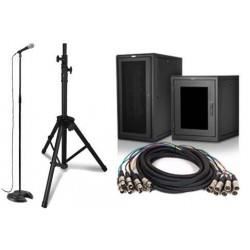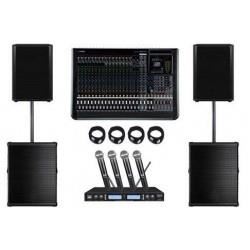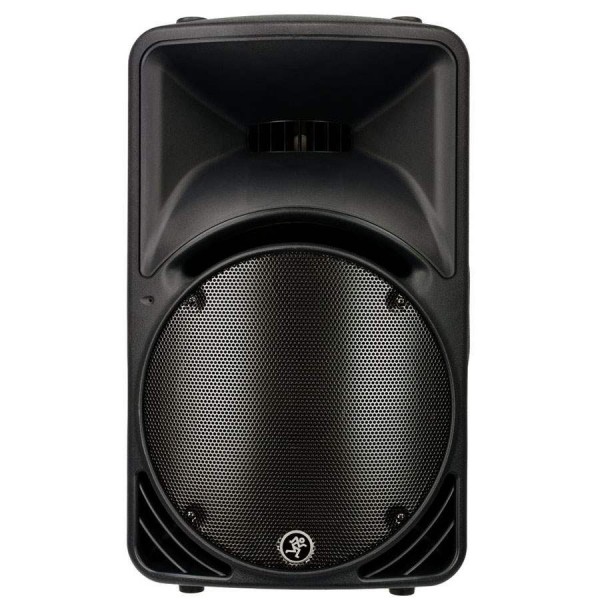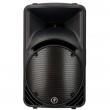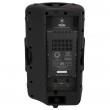Mackie C300Z
Mackie C300z Passive Speaker
Mackie C300z 2-Way Speaker is equipped with a 12" high-efficiency woofer and a 3" voice coil with a 1-3/4" titanium diaphragm compression driver. The C300z handles a massive 600W of peak power at 8 ohms, and has a 45Hz-20kHz frequency response for clear sound across the spectrum. The C300z speaker's EQ and crossover points are meticulously chosen so that beam-width patterns match in both drivers, delivering natural sound at all volume levels. The Mackie C300z is pole-mountable and flyable. With its trapezoidal shape the C300z speaker can also be used as a stage monitor.
Fetures
- Portable Precision Passive loudspeaker with 1.75" HF compression driver and 12" LF transducer
- HF compression driver mounted on a multi-celled aperture, with a constant directivity horn for room-wide 90° x 45° dispersion
- Precise reproduction of critical upper mid-range and high frequencies
- Tough, impact-resistant enclosure with sturdy handles, polemount, and integrated rigging points
- Designed for optimum performance with Mackie powered mixers and power amplifiers
- 750W peak power handling
- 3 setup configurations: polemount, flyable, and wedge
Precision Tuned by the Speaker Brains at EAW
Mackie's C Series passive loudspeakers represent Mackie's first lightweight passive speakers tuned exclusively by the EAW loudspeaker engineering team-a team with more than 25 years of high-output loudspeaker expertise, having created loudspeaker systems for critical applications as diverse as the Super Bowl, Iron Maiden, and the Pope. Although loudspeakers for these mega-systems cost exponentially more than the stalwart C300z, many of the same concepts have been applied, namely: designing custom 12" LF drivers with a frequency range from 50Hz-3000Hz and a 3" voice coil that can take a pounding. It also has a 1.75" high-frequency titanium driver and horn providing a wide, controlled dispersion pattern, and precise reproduction of the critical 1000Hz-20,000Hz upper mid-range and high frequencies.
Crossovers Tuned to Perfection
Tuning a crossover (i.e. voicing a system), involves dozens of critical decisions that many manufacturers overlook. In the end, it is all about balancing the design so that you get the best subjective results from the speaker while maintaining a good technical implementation. The crossover in the C Series is a unique Low Impedance Compensated Crossover (LICC) design with an asymmetrical slope. With EQ and crossover points meticulously chosen so that beam-width patterns match in both drivers, C Series loudspeakers offer natural sound at all volume levels.
Ultra-Wide Dispersion
Ever been to a show where the music sounds great in front, but craps out once you get to the back or sides of the room? The C300z was given a multi-cell horn throat aperture to avoid that situation. Sure, it's hard to say, but what it does is allow for much wider and more even dispersion of high and mid frequencies-so the wallflowers get the same great listening experience as those up front.
Better Than Your Average Box
Anyone with a factory can build a box and stick some speakers in it (and that's just what many do). But low-frequency transducers in square boxes can create resonances that reflect off the rear wall and pass through the woofer cone out of phase, and ready to mess up your sound. The C300z enclosure is an asymmetrical monocoque design with no parallel surfaces, causing mid- and high-frequency resonances to be reflected at angles into internal damping materials, instead of interfering with the woofer doing its thing.
Superb Floor Monitor
A good floor monitor plays loudly without generating feedback through vocal microphones. A poor floor monitor, on the other hand, will generate feedback just about the time you turn it up to a useable level. Floor monitor feedback is often caused by uneven frequency response and dispersion; some frequencies arrive at the microphone much louder than others. These spikes are what trigger feedback as the floor monitor volume is increased. The Mackie C300z has incredibly smooth, spike-free response and dispersion over a wide range of treble frequencies, so you can increase its volume without boosting those nasty, feedback-inducing spikes.



